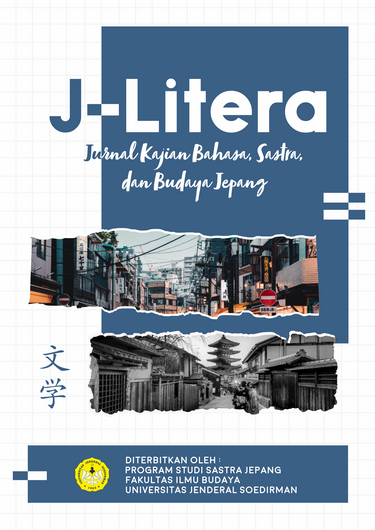Epentesis Vokal Baku pada Kata Serapan Bahasa Jepang dari Bahasa Arab Termin Keislaman
Abstract
The epenthesis of a vowel in Japanese loanwords (onintenka), not to mention from the Arabic language, is occurred generally tends into the category of default vowel. This default vowel of epenthesis often makes the difficult for Japanese language learners to write or to understand the writing of loanwords from other foreign languages into the Japanese language. Therefore, the purpose of this research is to examine the phonological process of default vowels of epenthesis on Japanese loanwords from Arabic, particularly those related in terms of Islamic words. The resource of the data was from an Islamic website written in the Japanese language by Japanese native speakers. The results of this study show that epenthesis in the Japanese language from the Arabic language were occurred in the epenthesis of vowel “o” and “u” in the middle and at the end of the loanwords syllable.
References
Battour, M. (2017). Muslim Travel Behavior in Halal Tourism. In M. Battour, Mobilities, Tourism and Travel Behavior-Context and Boundaries (pp. 3-16). IntechOpen: https://doi.org/10.5772/intechopen.70370.
Hamzah. (2018). Arabic Language in Japan. ALDEBAL, 3(1), 85-104.
Hariani, D. (2017). Halal Japanese Culinary as Attraction for Muslim Travellers to Visit Japan. Conference: International Conference on Tourism, Gastronomy, and Tourist Destination (ICTGTD 2016) (pp. 174-176). Paris: Atlantis Press.
Henderson, J. C. (2016, Aug 17). Muslim travellers, tourism industry responses and the case of Japan. Tourism Recreation Research, 41(3), 339-347.
Hirayama, M. (2003, Jan 1). Contrast in Japanese vowels. Toronto Working Papers in Linguistics, 20.
Kakeru , Y., Konishi, T., Hanzawa, k., Short, G., & Kondo, M. (2015). Vowel epenthesis in Japanese speakers' L2 English. 18th International Congress of Phonetic Sciences. Glasgow: ICPhS 2015.
Kang, Y. (2011). Loanword Phonology. The Blackwell Companion to Phonology, 1-48.
Kubozono, H. (2002, April 30). Prosodic Structure of Loanwords in Japanese: Syllable Structure, Accent and Morphology. Journal of the Phonetic Society of Japan, 6(1), 79-97.
Kubozono, H. (2017). The phonetics and phonology of geminate consonants (Vol. 2). Oxford: Oxford University Press.
Nomura, J., & Ishikawa, K. (2016, June 23). Effects of first language processes and representations on second language perception: The case of vowel epenthesis by Japanese speakers. International Journal of Bilingualism, 22(1), 69-87.
Riggs, D. (2013). Minimal Salience and the Quality of Epenthetic Vowels in Loanwords. The 41st Annual Meeting of North East Linguistic Society. Pennsulvania: Norths East Linguistic Society.
Shinohara, S. (2000, Jan). Default Accentuation and Foot Structure in Japanese: Evidence from Japanese Adaptations of French Words. Journal of East Asian Linguistics, 9, 55-96.
Shoji, S., & Shoji, K. (2013). Vowel Epenthesis and Consonant Deletion in Japanese Loanwords from English. 2013 Annual Meeting on Phonology. Massachusetts: Linguistic Society of America.
Uffmann, C. (2006, June). Epenthetic vowel quality in loanwords: Empirical and formal issues. Lingua, 116(7), 1079-1111.
Uffmann, C. (2012). Vowel Epenthesis in Loanword Adaptation. Berlin, Boston: Max Niemeyer Verlag.
Yan, L. S., Zahari, N. A., Ismail, A. S., & Zain, N. M. (2017). Halal Tourism: A New World for Tourism Industry. International Journal of Asian Social Science, 7(8), 643-657.
Authors who publish with J-Litera: Jurnal Kajian Bahasa, Sastra dan Budaya Jepang agree to the following terms:
- Authors retain copyright and grant the journal right of first publication with the work simultaneously licensed under a Creative Commons Attribution License (CC BY-SA 4.0) that allows others to share the work with an acknowledgment of the work's authorship and initial publication in this journal.
- Authors are able to enter into separate, additional contractual arrangements for the non-exclusive distribution of the journal's published version of the work (e.g., post it to an institutional repository or publish it in a book), with an acknowledgment of its initial publication in this journal.
- Authors are permitted and encouraged to post their work online (e.g., in institutional repositories or on their website) prior to and during the submission process, as it can lead to productive exchanges, as well as earlier and greater citation of published work.













.png)




